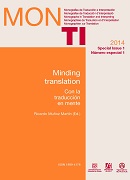The impact of translators’ ideology on the translation process: a reaction time experiment
Article Sidebar

Main Article Content
Ana María Rojo López
Marina Ramos Caro
This paper presents an experiment designed to measure the influence that a translator’s political stance may exert on the time needed to find a translation solution when working with ideologically loaded concepts. To this purpose, a reaction time experiment (with positive and negative prompting conditions) was designed to evaluate whether words and expressions that are contrary to the translator’s ideology may slow down the translation process, making translators take longer to find an adequate translation. Our hypothesis predicted that the reaction time of translators would be bigger when the English word was presented with a negative “prompt”, that is, with a word they would feel contrary to their political views. Differences in reaction times between two groups of translators with different ideological viewpoints would provide empirical support for the claim that translators may be influenced by their ideological views. The results will contribute to increase translators’ awareness of the impact that issues such as ideology and power may have on their work.
Keywords
Translation process, Ideology, Reaction time
Article Details
How to Cite
Rojo López, Ana María; and Ramos Caro, Marina. “The impact of translators’ ideology on the translation process: a reaction time experiment”. MonTi: Monografías de Traducción e Interpretación, pp. 247-71, https://raco.cat/index.php/MonTI/article/view/292856.